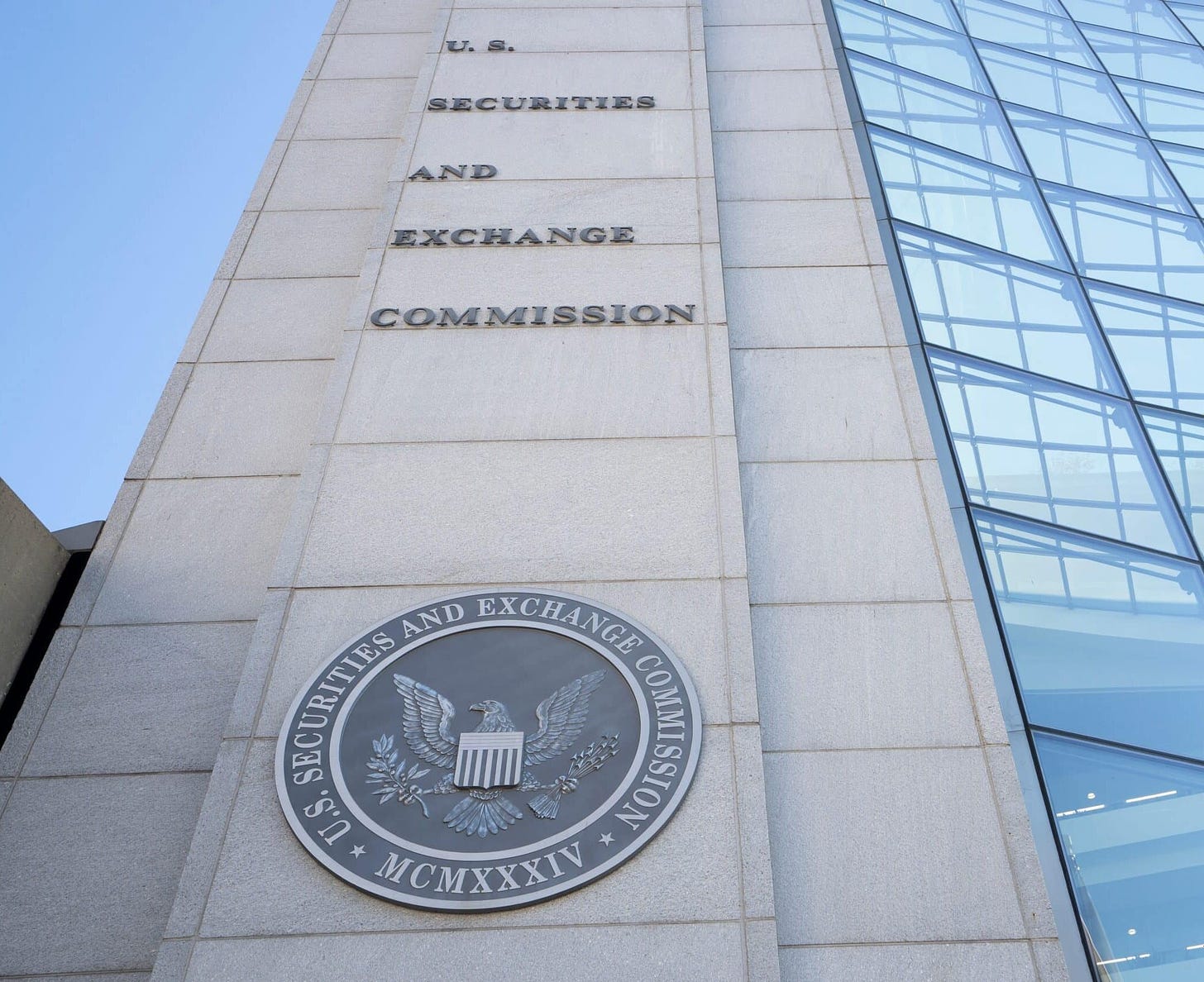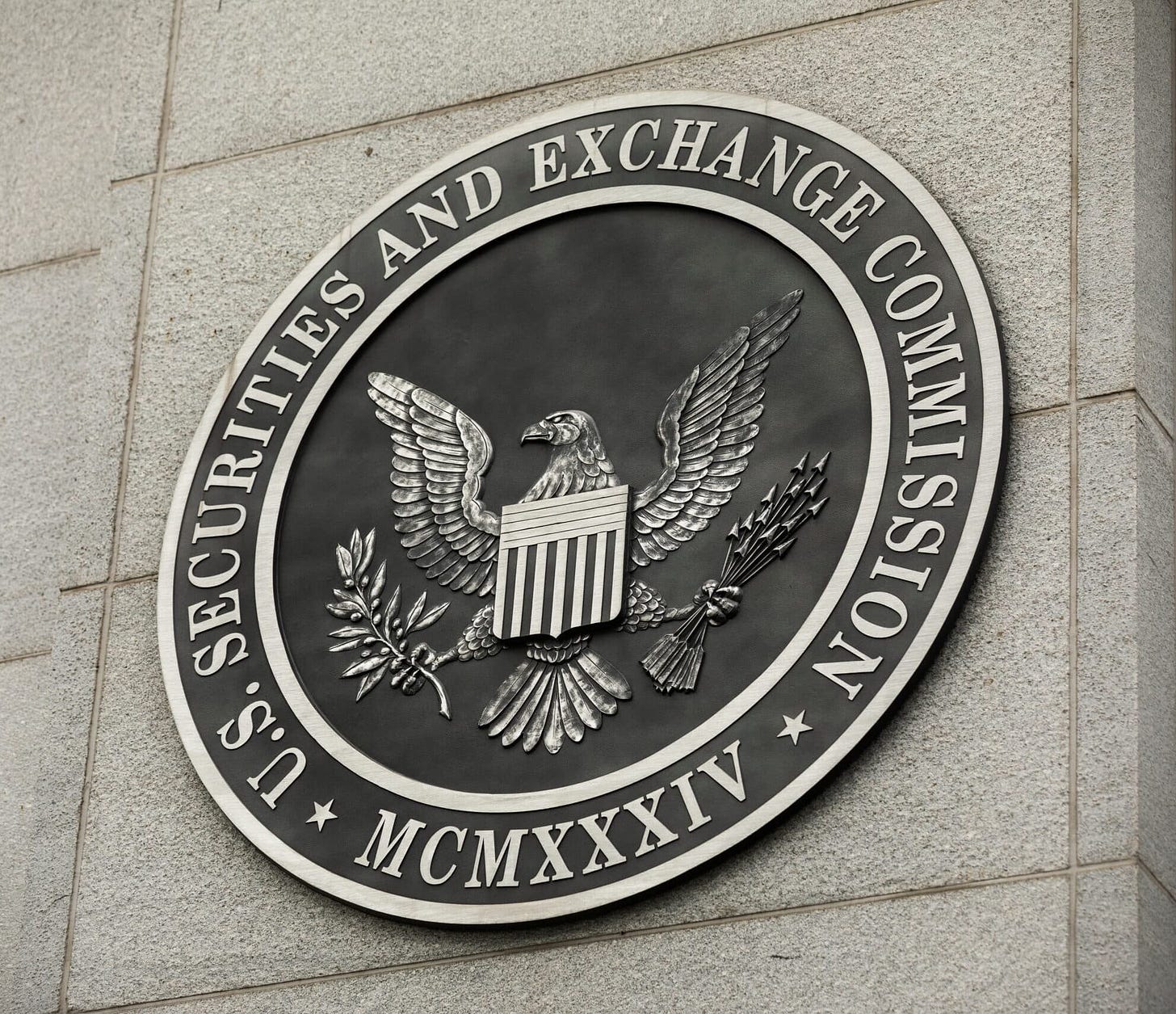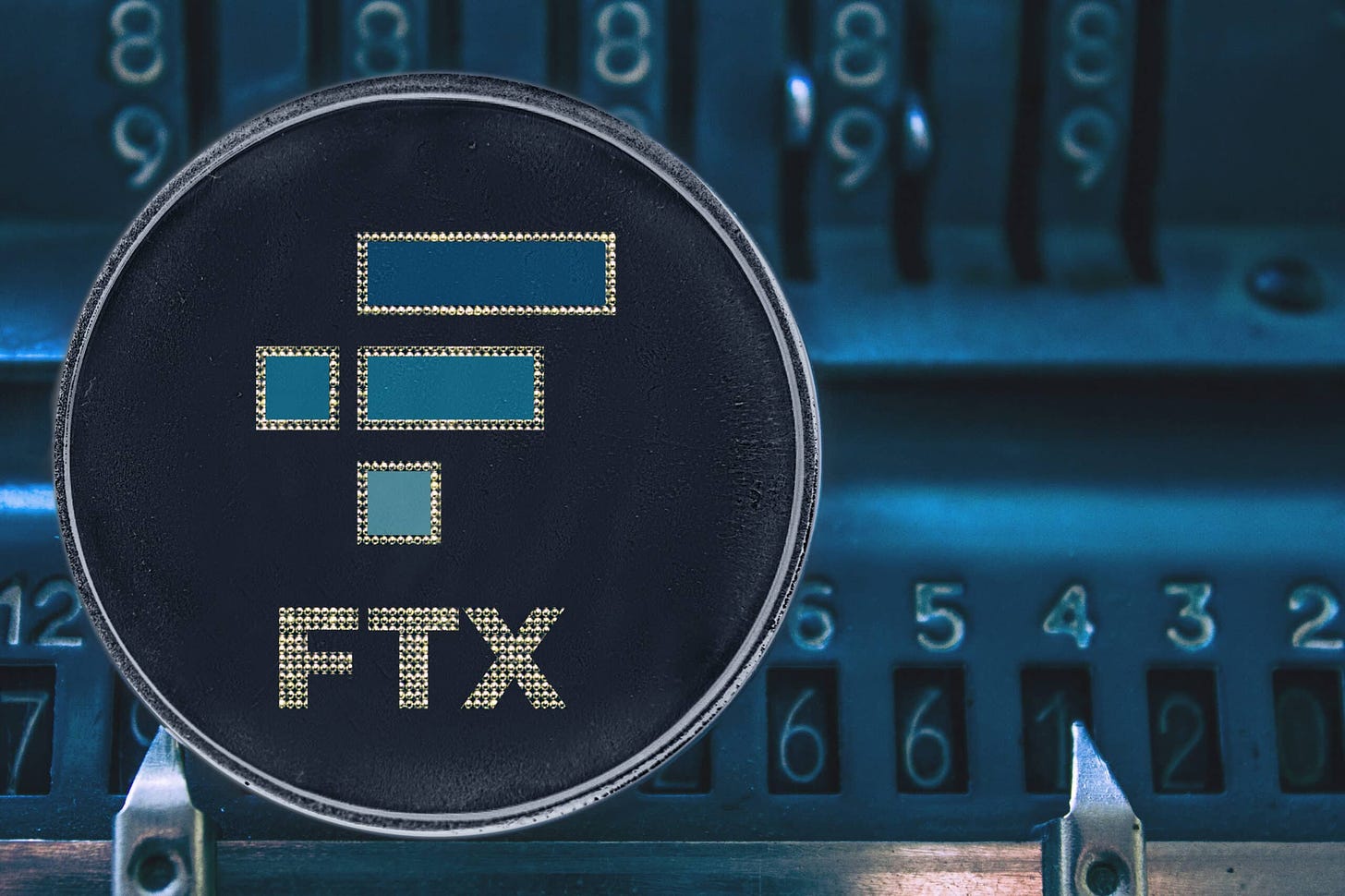Is 25 Years in Prison Fair for Sam Bankman-Fried?
Weekly News Recap: 🏦 Coinbase's SEC standoff, 🎮 Munchables' quick fix, ⚖️ Tornado Cash dev in court, ✈️ Binance's exec escape, 📉 KuCoin under fire, 💡 BlackRock's ETF Optimism.
You are reading the Unchained Weekly newsletter, where we cover all the major news in the crypto space, providing insights into the market's latest trends, regulatory shifts, and technological advancements. Stay informed with your no-hype resource for all things crypto.
If You Like Unchained: Refer us with a friend and earn a Premium subscription!
In a landmark decision, Sam Bankman-Fried, the co-founder of FTX, faced a 25-year prison sentence alongside a staggering $11 billion forfeiture. This sentencing by Judge Lewis Kaplan marked a significant moment in the crypto world, addressing the massive fraud case that has gripped the industry.
The judgment highlighted Bankman-Fried's approach to risk and decision-making, particularly his reliance on "expected value" calculations without due regard for potential consequences, which Kaplan critiqued for its evident lack of remorse.
On Unchained, Sam Enzer, a legal expert, breaks down the nuances of the sentence, discussing its fairness and the mechanics of the forfeiture process. Enzer also offers insights into Bankman-Fried’s anticipated prison conditions and his subsequent supervised release. Reflecting on Bankman-Fried's actions, Enzer characterizes them as "a deliberate choice, a cold calculated choice, a criminal choice," underscoring the gravity of the choices leading to this historic sentencing.
Listen to the episode on Apple Podcasts, Spotify, Fountain, Overcast, Podcast Addict, Pocket Casts, Castbox, Google Podcasts, Amazon Music, or on your favorite podcast platform. Or watch it on YouTube.
Weekly News Recap
Court Denies Coinbase's Attempt to Dismiss SEC Charges
A Manhattan federal court has ruled against crypto exchange Coinbase, allowing the Securities and Exchange Commission (SEC)'s lawsuit, which alleges unregistered sales of securities by the cryptocurrency exchange, to proceed to trial. This decision marks a significant victory for the SEC and could have wide implications for the crypto industry.
The lawsuit, filed in June, accuses Coinbase of operating as an unregistered broker and exchange. The SEC is seeking to permanently stop the company from continuing such activities. Judge Katherine Polk Failla, in her ruling, stated that the "crypto" label doesn't change the nature of the transactions, which fit within the long-standing legal framework for identifying securities.
Despite the court's decision, it did agree to dismiss part of the SEC's complaint pertaining to Coinbase's Wallet application, stating it did not act as an unregistered broker in this instance.
Following the news, Coinbase's shares dropped around 2.5%. The company's chief legal officer, Paul Grewal, responded on Twitter by saying "We were prepared for this."
Also this week, Coinbase announced its intention to significantly increase the portion of its customer and corporate USDC balances stored on Base, its Ethereum layer 2 network. This shift aims to leverage the benefits of blockchain technology, including enhanced security, reduced fees, and faster settlement times for its users. Currently, Coinbase holds $256 million in USDC, with a significant portion already on Base.
Coinbase's initiative comes at a time when Base has demonstrated significant growth, achieving a Total Value Locked (TVL) of over $1 billion, with substantial activity spikes following Ethereum's recent Dencun upgrade.
Munchables' Swift Recovery: $62 Million in ETH Restored After Security Breach
In a remarkable turnaround, the Web3 gaming platform Munchables successfully reclaimed $62.5 million worth of Ethereum (ETH) lost in a security exploit on Wednesday. The funds were returned by a developer who was linked to the theft, affirming the integrity of the platform's security measures. Munchables, which operates on the Ethereum layer 2 network Blast, encountered the security breach when unauthorized transactions were traced back to an internal team member, sparking concerns of a potential inside job.
Following intensive investigations led by blockchain detective ZachXBT, speculations arose about the exploiter's connections to North Korean hackers, although conclusive evidence has not been found. The breach was enabled by smart contract permissions that allowed the developer to execute fund transfers, a vulnerability that was exploited to siphon 17,413 ETH from the platform.
In a statement on X, Munchables reassured its users, declaring that "All user funds are safe," and also announced the unconditional return of the stolen assets to a multisig wallet, safeguarding the platform's liquidity. The community's response has been overwhelmingly positive, with many applauding the swift action taken to secure the return of the funds without resorting to controversial measures such as rolling back the blockchain.
Dutch Court Considers 64-Month Sentence for Tornado Cash Developer
Dutch prosecutors recommended a 64-month jail sentence for Alexey Pertsev, the developer behind Tornado Cash, for alleged involvement in laundering $1.2 billion through the cryptocurrency mixing service. Pertsev's trial, which could set a precedent for the legal treatment of open-source project developers, took place over two days, with a verdict expected on May 14. Arrested in August 2022 following Tornado Cash's blacklisting by the U.S. Treasury for its alleged connection to North Korean hackers, Pertsev's case highlights the ongoing debate over the role of privacy tools in the crypto ecosystem and their legal implications.

Binance Executive Flees Amid Tax Evasion Charges in Nigeria
In a turn of events that has captured international attention, Binance, the world's largest cryptocurrency exchange, finds itself embroiled in controversy in Nigeria. Nigerian authorities have levied four counts of tax evasion against Binance, including allegations of non-payment of Value-Added Tax (VAT) and company income tax, failure to submit tax returns, and aiding customers in tax evasion. Alongside these charges, two of Binance's senior executives, U.S. citizen Tigran Gambaryan and British-Kenyan citizen Nadeem Anjarwalla, were detained in Nigeria.
In a dramatic development, reports emerged that Nadeem Anjarwalla had managed to escape from custody in Abuja, Nigeria's capital. This escape coincides with Nigerian authorities intensifying their legal actions against Binance by filing new tax charges. The Nigerian Federal Inland Revenue Service announced these charges amid ongoing tensions between the Nigerian government and Binance.
Binance responded to the situation by stating "We were made aware that Nadeem is no longer in Nigerian custody. Our primary focus remains on the safety of our employees, and we are working collaboratively with Nigerian authorities to quickly resolve this issue."

Regulators Target KuCoin and Call ETH a Commodity
In a concerted effort to enforce regulatory compliance, the Commodity Futures Trading Commission (CFTC) and the Department of Justice (DOJ) simultaneously targeted KuCoin with serious allegations. The CFTC's complaint against the exchange encompasses charges of illegal dealings in off-exchange commodity futures transactions, including major cryptocurrencies like bitcoin, ether, and litecoin, without the necessary registration and adherence to regulatory standards. This regulatory action emphasized the requirement for KuCoin to align with all applicable regulations and highlights ether and litecoin as commodities within the scope of the CFTC's authority.
Parallel to the CFTC's legal action, the DOJ accused KuCoin and its founders of anti-money laundering violations, specifically criticizing the exchange's lack of an effective anti-money laundering (AML) program and adequate know-your-customer (KYC) procedures. These charges allege that KuCoin facilitated the transmission of over $4 billion in suspicious and criminal funds.
Following these allegations, KuCoin experienced a notable withdrawal of assets, with $273 million leaving the platform as users reacted to the potential implications of these legal challenges.
BlackRock CEO Remains Optimistic About Ethereum ETF Prospects
Larry Fink, CEO of BlackRock, the world's leading asset management firm, maintains a positive outlook on the potential for an Ethereum ETF, even amid speculation that the SEC might classify ETH as a security. This optimism follows the successful launch and significant growth of BlackRock's Bitcoin ETF and its Ethereum-based tokenized fund, indicating a strong start in the cryptocurrency-based fund market. With over $17 billion in assets under the Bitcoin ETF and nearly $245 million minted in Ethereum-based BUIDL tokens, BlackRock is positioning itself as a major player in the digital asset space. Fink's confidence suggests a belief that the regulatory designation of Ethereum will not hinder the approval and success of a potential Ether ETF.
SEC Seeks Nearly $2 Billion Fine from Ripple
The SEC proposed a hefty fine against Ripple Labs, totaling almost $2 billion, marking a significant moment in the regulator's ongoing enforcement actions against the cryptocurrency industry. The SEC's filing in a New York court asked Judge Analisa Torres to enforce the fine, emphasizing the need to deter Ripple and others from future violations related to unregistered securities sales.
The fine comprises $876 million in disgorgement, $198 million in prejudgment interest, and an additional $876 million in civil penalties, related to Ripple's direct sales of XRP tokens to institutional investors. The SEC argues that these sales, amounting to nearly $1 billion, were conducted without necessary registrations, undermining the financial market's legal structure.
Ripple, for its part, has signaled its intention to vigorously contest the SEC's claims. The company's executives have criticized the SEC's approach, accusing the regulator of misleading and punitive tactics. Ripple's response to the proposed judgment is anticipated by April 22.
Meanwhile, House Republicans urged the SEC to provide clarity on whether ether is a security before Prometheum can custody it, warning of market disruption if classified as such.
FTX Bankruptcy Estate to Sell Major Stake in AI Firm Anthropic for $884 Million
FTX's bankruptcy estate is set to sell two-thirds of its stake in the AI startup Anthropic for $884 million, a significant transaction that values the stake at more than twice the acquisition cost by Sam Bankman-Fried in 2021. The deal involves various institutional buyers, including Jane Street and Fidelity-managed funds, underscoring the high interest in Anthropic's potential. The move is part of the estate's efforts to maximize returns for creditors from FTX's assets.
Ethereum's Blob Fees Soar Due to 'BlobScriptions' Protocol
Ethereum's gas fees for transactions involving “blobs” have surged exponentially following the introduction of a new protocol named “Etherscriptions,” just weeks after the Dencun upgrade was implemented to lower costs. The “BlobScriptions” feature allows users to inscribe data onto blobs, leading to a dramatic increase in the blob base fee to 14,499,530 wei. This spike contrasts with the intended effect of the Dencun upgrade, which was designed to make transactions cheaper by enabling rollups to store data temporarily in blobs rather than permanently in calldata.










